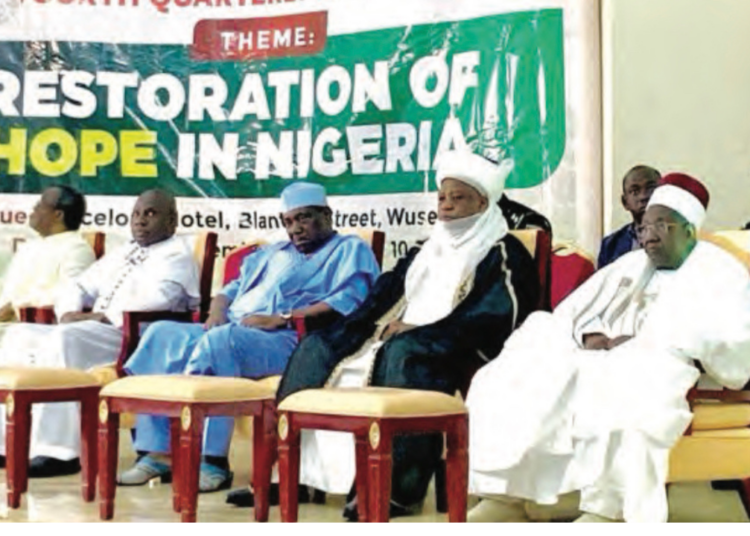This topic, Restoration of Hope in Nigeria, has recently attracted the attention of politicians. Almost all presidential candidates in the 2023 elections have addressed hope in the Nigerian project from varying perspectives. A few days ago, on November 5, 2023, to be precise, the Nigeria Inter-Religious Council (NIREC) held its 4th Quarterly Meeting in Abuja with the same theme. Restoration of Hope in Nigeria, therefore, can only be discussed with hovering over politics and leadership issues in Nigeria. We cannot, as religious leaders, avoid discussing the role of religion in our democratic polity. So, this is a frank discussion on whatever ails the Nigerian state that makes addressing this topic pertinent.
When will tomorrow come?
Whenever people, especially the youth, express dissatisfaction with how things are in the country, they are told to be patient and make sacrifices today to improve their tomorrow. Many have been patient, enduring the unbearable, but the better-tomorrow promise keeps eluding them. The leaders of tomorrow see no tomorrow in the number of years they spend to attain graduation due to incessant strikes. Still, there are no job opportunities for those who graduated despite all odds, even those with masters or PhDs. It is alleged that jobs are now for the highest bidder, starting from 3 to 10 million naira. There appear to be no employment opportunities, but people in high places receive regular letters from heads of government agencies urging them to submit names for immediate employment. Such opportunities do not include children from low-income families. And even crumbs of such job offers in the market are beyond the reach of people experiencing poverty.
The story gets worse on security as bandits continue to call the shots in some parts of the country. Kidnapping for ransom is fast becoming an occurrence, even in the Capital City of Abuja. Insurgency is very much alive in some states of the Federation.
Therefore, many people see no future for themselves in Nigeria and leave in groves for greener pastures outside the country.
The Yoruba word which has gained currency for relocating to other lands is JAPA. Different reasons are advanced for leaving the country, not least the state of our infrastructure, lack of equal opportunities (as stated earlier), endemic corruption in the public space and insecurity, among others. More worrying is the departure of medical practitioners – doctors, nurses and other healthcare professionals. In one of the states in Northern Nigeria, only 112 doctors ‘are reportedly left on the state’s payroll, which is inexorably failing to bridge the country’s doctor-patient ratio (1:7000).
Also, I’d like to remind you that sometime last year, the Nigerian Association of Resident Doctors found that about 50 per cent of Nigerian doctors had already found their way out of the county. The University College Hospital, Ibadan, Oyo State, also noted that more than 600 clinical workers have resigned from their appointments. At the same time, the Lagos State University Teaching Hospital disclosed that more than 150 nurses left their appointments with the tertiary hospital.’
Sadly, most people leaving the country are ‘highly skilled individuals with abundant talents across different sectors.’ Unfortunately, more want to go. Many WhatsApp groups of Nigerians living in Europe and America encourage people to leave Nigeria by offering free counsel on facilitating the emigration by all means necessary, legal or otherwise. What happens to Nigeria if its best brains are drained to foreign climes in a few years? What happens to the quality of our healthcare? What are we doing to replace the services of nurses and doctors who have emigrated to foreign lands?
How did we reach this point?
Frustration will quickly come to mind as a response. The youths are disappointed, ‘frustrated with socio-economic challenges fuelled by unfulfilled government promises and bad leadership marked by the absence of transparency and accountability.’ As religious leaders, have we failed to convey the right messages to those in authority? No, we have not. The messenger’s duty is not to be a warden over the people but to convey the message.
We have repeatedly emphasised the virtue of trustworthiness to people who will raise the Holy Book with their right hands to take a solemn covenant with their Maker to maintain the trust placed on their shoulders and not betray it. For most of them, after ratifying the pledge, the order of the day is greed and avarice. In public office, mind-boggling revelations of looting and unbridled stealing from the public purse continue to create the impression that we have lost our trajectory. It is even believed in some quarters that those criticising stealing only wait in line for an opportunity to steal or pilfer the treasury. What a shame to think that almost all the people in public office are either Muslims or Christians!
Restoring the hope
It is time we started restoring hope in this country despite the disillusionment and cynicism with which it is charged. We need leaders who are ‘ready to work and institute changes amidst the sea of hopelessness, people who can inspire the citizens as did former President Barack Obama in his address to the United Nations General Assembly in 2014 where he said, “We choose hope over fear. We see the future not as something out of control but as something we can shape for the better through concrete and collective effort…”
In this connection, we should also look at the Renewed Hope Agenda of the Tinubu Government. This suggestion is not a campaign for anyone to be president. By Allah’s leave, Bola Ahmed Tinubu is the President and Commander in Chief of the Armed Forces, Federal Republic of Nigeria. He is just coming in. He needs our prayers to surmount all the problems he inherited and is willing to address. Why not give him the benefit of the doubt?
My religion teaches me to hear and obey whoever becomes my leader. I will not abuse, but I can criticise and counsel such leaders in ways that will be effective. Also, I am to be fair and just, even against myself and the people nearest to me.
At home and abroad, Nigerians will take the President to task on his promises to us on how he intends to renew our hope in this country.
Napoleon Bonaparte is instructive in his words that a leader is a dealer in hope. Let us examine and interrogate what deals the President offers to restore our hope.
What is the level of this reaching out to all as promised by Mr President? From what he has done so far, what is the level of consultation and dialogue with stakeholders in arriving at significant decisions on pressing national issues? Is the President keeping to his words?
What is this administration doing on security? How are things different from what they inherited to where we are today? What reforms are we to see in the security architecture of this country?
What is this government doing to reduce unemployment, instil confidence in our youth, promote domestic manufacturing and increase power generation in Nigeria?
How will this administration enhance agriculture so farmers can produce more and Nigerians have food at affordable rates?
Tudun Biri
Nigerians were once again woken up, shocked, with the unfortunate news of yet another inexcusable bombing of innocent civilians in Tudun Biri, Igabi Local Government of Kaduna State. The latest callous attack on this community has claimed the lives of more than 90 people, with over 70 injured. The Nigerian Military, with a straight face, claimed responsibility and, as usual, claimed it was “an error“ in operation.
But this is one mistake too many, with no evidence of any sanction or accountability. For example, in 2017, a military similar“ error” occurred at a refugee camp in Borno State, which housed about 43,000 people, where many lives were annihilated and hundreds of casualties recorded. Similarly, in June this year (2023), a group of Fulani with their cattle were bombed and perished in Nasarawa State. The Nigerian security operatives said all these attacks were ’a mistake’. Civilians are being exterminated like mosquitoes. Enough is enough of these grievous “mistakes” in which hundreds of innocent lives are being lost, and millions of naira worth of property are destroyed. These incidents raise serious questions about the integrity of the intelligence before actions are taken.
We therefore call on the Nigerian military to, as a matter of urgency, thoroughly investigate what happened and bring the culprits to book. They should also look into the plight of the victims of the Tudun Biri bombardment and pay compensation (Diyyah) to the families of those affected. In addition, those behind these recurring mistakes must be held accountable. This will serve as a deterrent.
The Council condoles the government, Emir of Zazzau and people of Kaduna State in this sad moment of grief. We hope the injured victims will be adequately taken care of. However, we call on all affected by this unfortunate incident and the Muslim Ummah in general to take heart and pray Allah to repose the souls of the dead and speedy recovery of the injured. As Muslims, we must be law-abiding as we believe the Kaduna State Government is doing all it takes on the issue.
Nafi’u Baba Ahmad, mni, is the secretary-general, SCSN.
The renewed hope
In the past, there were complaints about who was appointed to what positions and which religion they professed. We recall the agitations that greeted the appointment of Service Chiefs. The concern then was that almost all came from one religion or region.
During President Goodluck Jonathan, Alex Badeh (Christian) was Chief of Defence, Kenneth Minimah (Christian) was Chief of Army Staff, and Usman Jibrin (Muslim) was Chief of Naval Staff. Others were Adesola Amosu (Christian), Chief of Air Staff; Sani Yakubu Audu (Muslim), Chief of Defence Intelligence; and Mohammed Dikko Abubakar, followed by Suleiman Abba (both Muslims), Inspector General of Police. There were three Muslims and three Christians.
During President Muhammadu Buhari, Abayomi Olonishakin (Christian) was Chief of Defence, Tukur Buratai (Muslim) was Chief of Army Staff, and Ibok-Ete Ekwe Ibas (Christian) was Chief of Naval Staff. Others were Sadique Abubakar (Muslim), Chief of Air Staff; Monday Riku Morgan (Christian), Chief of Defence Intelligence and Ibrahim Kpotun Idris, followed by Mohammed Adamu, and later Usman Alkali Baba (all Muslims), Inspector General of Police. There were three Muslims and three Christians.
During the present tenure of President Bola Ahmed Tinubu, we have Christopher Musa (Christian), Chief of Defence, Toareed Lagbaja (Christian), Chief of Army Staff and Emmanuel Ogalla (Christian), Chief of Naval Staff. Others are Hassan Abubakar (Muslim), Chief of Air Staff; Emmanuel Undiandeye (Christian), Chief of Defence Intelligence; and Kayode Egbetokun (Christian), Inspector General of Police. There are now five Christians and one Muslim as our Service Chiefs.
As I said earlier, everybody is either happy or not complaining. We hope that when this equation changes now or in the future, everybody will be satisfied and not complain.
The President can and has now changed that perception and restored hope in some quarters. He established that there was nothing to fear; Muslims and Christians would be treated fairly. There will not be cries of marginalisation or preference for one over the other; to the Mosque or the Church, the President is the father to all. Everybody is either happy or not complaining.
There is still hope for Nigeria if we return to correct values that place a good name over materialism and possessions. There will be more hope when we agree that we came empty and will leave empty but will account for everything we did in the journey of ‘from emptiness to emptiness’.
Nafi’u Baba Ahmad, mni.
Secretary-General,
SCSN.
We’ve got the edge. Get real-time reports, breaking scoops, and exclusive angles delivered straight to your phone. Don’t settle for stale news. Join LEADERSHIP NEWS on WhatsApp for 24/7 updates →
Join Our WhatsApp Channel










